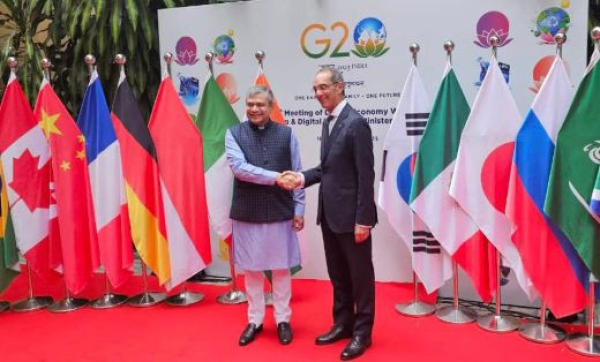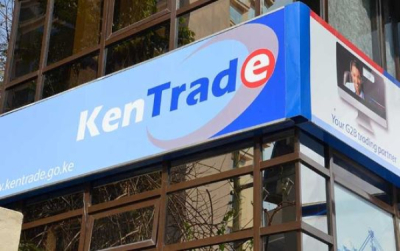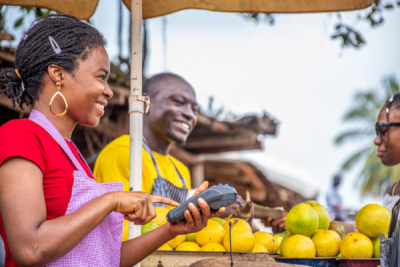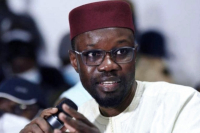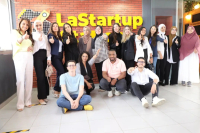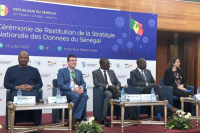In recent years, Egypt has made major strides in its digital transformation. To further achieve these goals, the government is searching for partners with shared digital ambitions.
Egypt's Minister of Communications and Information Technology (MCIT), Amr Talaat (photo, right), recently met his counterparts, Abdullah Al-Swaha from Saudi Arabia and Shri Ashwini Vaishnaw (photo, left) from India, to explore ways of strengthening their cooperation in the field of Information and Communication Technology.
The meetings were held on the sidelines of the G20 Ministerial Meeting on the Digital Economy, which took place on Saturday, August 19 in Bangalore, India.
According to the Saudi Press Agency (SPA), discussions between Abdullah Al-Swaha and Amr Talaat focused on strategic projects to promote youth, women, and entrepreneurship. Emphasis was placed on the importance of strengthening bilateral cooperation in critical areas such as communications infrastructure and subsea cables.
The meeting with India's Minister of Railways, Communications, Electronics, and Information Technology, Shri Ashwini Vaishnaw, focused on ways to implement the digital MoU they signed in January. They also discussed means of cooperation in the electronics industry, digital capacity building through partnerships between training institutions affiliated with the two ministries, and possible collaboration in digital infrastructure to support digital transformation.
Also in India, Amr Talaat held talks with Omar Al-Olama, UAE Minister of State for Artificial Intelligence, Digital Economy, and Telework Applications. The two ministers agreed to strengthen cooperation between the two countries in the fields of artificial intelligence and data governance.
The meetings, initiated several months ago by the Egyptian ICT Minister, are part of Egypt's Vision 2030 and its digital transformation strategy, which aim to strengthen economic and social development in all sectors and make the country a digital pole of excellence in Africa.
Samira Njoya
After studying in Canada and working as a consultant at McKinsey, Sophia Alj became a digital entrepreneur, launching this startup for dentists.
Mondentiste.ma is an e-health solution developed by a young Moroccan startup. It allows dentists to manage their daily appointments and patients to schedule dental care appointments in several cities throughout the country. The app was launched in Casablanca in 2017 by Sophia Alj, a serial tech entrepreneur who also co-founded the startup Chari.ma and co-leads the incubator Wib.co.
The goal is to "connect dental health professionals, patients, and advertisers in the oral hygiene sector."
The solution features a mobile application available on iOS and Android for healthcare professionals. Dentists, using their smartphones, can check their appointment schedules in real time, book new appointments, and accept and modify online appointment requests. Patients, for their part, can access the service only via its web platform.
Users are not required to have an account to browse the platform. All they have to do is, based on their location, use the search bar and look up a dentist from available options. Next, they schedule an appointment, provided that the timeslot picked is available. With Mondestiste.ma, it is also easy to find a specific dentist, given that the user knows the first and last names of this professional.
The platform also includes a blog where topics related to oral health are discussed. Since its launch, the Mondentiste.ma app has been downloaded over a hundred times.
Adoni Conrad Quenum
Kenya’s ambition is to become a digital hub in sub-Saharan Africa. To achieve that ambition, the government and its partners are implementing innovative projects to expand the country’s digital economy.
AI tech solutions provider Webb Fontaine recently partnered with state agency Kenya Trade Network Agency (KenTrade) to introduce the Digital Logistics Market Place (DLMP) in Kenya. This platform aims to reshape logistics practices, increase trade volumes, accelerate e-commerce growth, and stimulate the development of Kenya's vast trading market.
"The DLMP is an online marketplace of trade.[...] It offers B2B services to traders with seamless search, find, and send capabilities, fostering growth, reliability, and empowerment," said Webb Fontaine CEO Alioune Ciss.
The introduction of DLMP in Kenya comes as the East African country aims to position itself as a digital hub in sub-Saharan Africa. It is part of KenTrade's strategy to digitize business activities in the country, to increase the contribution of digital trade to the country's economy.
The DLMP brings together shipping lines, trucking companies, freight forwarders, importers, exporters, warehousing companies, and insurance providers in an integrated digital marketplace. This platform gives traders the opportunity to present their services online and compete for bids, fostering a competitive environment that stimulates efficiency and cost savings.
Through this partnership and the establishment of the DLMP, the two entities hope to capitalize on Kenya's strategic location, solid infrastructure, and diversified economy. The aim is to make the DLMP the cornerstone for the continued development of Kenya's booming commercial market.
Samira Njoya
The Cameroonian market is witnessing a growing number of solutions developed by natives who are intent on creating local solutions for local problems. Almost every sector is concerned including the e-mobility sector. Last April, that sector notably welcomed Ongo, an urban and interurban transport app. Following in its wake, Klandoo was launched by a member of the diaspora who returned to Cameroon to contribute to the development of his native country.
Klandoo is an e-mobility application developed by a Cameroonian start-up, recently launched to facilitate access to transport.
True to the startup’s spirit, the application (available for Android and iOS devices) allows users to easily book rides. All they have to do is to create an account or log into an existing one, enter the departure and destination points then select the type of car they want.
Klandoo will then suggest drivers close to the departure point along with an estimate of the fare to be paid. Once at their destination, the application urges users to rate their experience and, drivers who receive the best ratings are included in users’ “favorite” lists.
"All the cars’ technical inspection files are checked, assuring a perfect driving experience. In the event of a road accident or any kind of aggression, drivers and clients are taken care of by partner hospitals," explains Serge Itjo, the founder of Klandoo. Serge Itjo explains that Klandoo drivers are considered “partners” working for their own accounts. Klandoo nevertheless collects 20% of drivers’ proceeds.
To ensure the security of both drivers and clients, Klandoo’s team tracks rides in real time. The startup is currently active in Douala, Yaoundé, and Kribi but it wants to conquer the whole Cameroonian market. According to Play Store data, the Android version of its app has already been downloaded more than a hundred times.
Adoni Conrad Quenum
With over ten years of experience in tech entrepreneurship, she has founded two companies that develop useful tech solutions adapted to African markets. Her entrepreneurial drive and innovations have been celebrated with several awards and distinctions.
Olajumoke Oduwole (photo) is a Nigerian entrepreneur and computer scientist. She graduated, in 2015, from the University of Lagos with a Master's in systems engineering with a major in artificial intelligence and software.
In 2021, she co-founded the fintech startup Alajo, of which she is currently the CEO. Through its eponymous application, her startup digitizes savings and credit transactions via a USSD infrastructure. The said application is designed for merchants, fast-growing businesses, unbanked, and even underbanked individuals. It has already helped its users save over 373 million naira (443,600 euros).
“Opportunely, the under- and un-banked now have access to financial products, services, and opportunities from corporates through data analyzed from their transactions,” Ms. Olajumoke told Disrupt Africa in April 2023.
Thanks to Alajo, Olajumoke Oduwole and Eniola Oladeinde (the co-founder of Alajo) took part in the Google for Startup Accelerator: Women Founders program.
Before Alajo, Ms. Olajumoke had already founded, in 2014, KJK Africa, a software development firm that creates sustainable software products and offers services aimed at increasing business efficiency, strengthening customer relationships, raising the visibility of operations, and increasing sales.
From 2012 to 2013, she worked for Bethel Group of Companies as a senior developer and IT manager. She also headed the brand, IT, and digital transformation departments at RegCharles Finance & Capital from 2013 to 2014. In 2018, she was a communications consultant to the Presidential Council for an Enabling Business Environment, Nigeria (PEBEC-EBES).
She has received several distinctions and awards for her work. In 2018, she was a top 10 finalist in the Seyi Tinubu Empowerment Program's Rising Tech Entrepreneur. In 2020, she made it to the Forbes Africa 30 Under 30 list.
Melchior Koba
Nearly half of the African population lacks access to digital financial solutions. To address this issue–meeting the needs of financially excluded and disadvantaged people– the African Development Bank (AfDB) and its partners have taken several steps.
India will contribute $2 million to the African Digital Financial Inclusion Facility (ADFI), a fund hosted and managed by the African Development Bank (AfDB). The Bank disclosed the news on August 2.
According to the AfDB, the money will help tackle bottlenecks to the growth and adoption of digital financial solutions, as well as accelerate financial inclusion in Africa.
#India pledges $2M to @ADFI_AfDB for digital financial solutions in Africa. India's #financialinclusion success offers valuable insights to scale up initiatives to meet the needs of the financially excluded. Learn more: https://t.co/v34gM3EpY1 #IntegrateAfrica pic.twitter.com/DAF80VDaQf
— African Development Bank Group (@AfDB_Group) August 2, 2023
"India's pioneering role in digital financial services, the extension of financial inclusion to remote rural areas, and the creation of infrastructure for digitizing financial services offer India an excellent opportunity to work within the ADFI partnership to share learning and expertise on public digital infrastructure to promote digital financial inclusion across the continent," said Manisha Sinha, Deputy Secretary to the Department of Economic Affairs and Principal Board Member of the ADFI for India.
Due to Covid-19, Africa’s need for greater digital financial inclusion expanded. As a result, less expensive dematerialized financial services were deployed to support those who have no or low access to formal banking services.
In 2019, the AfDB launched the ADFI fund with an initial endowment of $40 million from the Bill & Melinda Gates Foundation, the Government of Luxembourg, and the French Development Agency: the African Digital Financial Inclusion Facility (ADFI).
By 20230 the fund hopes to devote $400 million to support the digital financial inclusion of 332 million people in Africa, 60% of whom are women.
India is recognized worldwide for having a thriving public digital payment system; a system that transformed governance, financial inclusion, and resilience for millions of people. The financial support of the Asian giant should thus advance AfDB’s goal regarding digital financial inclusion.
Samira Njoya
An Ivoirian entrepreneur, Rukayatou Saka (pictured) is the founder and CEO of Paiement Pro. She holds a degree in computer engineering obtained in 2012 from the School of Multimedia Specialities in Abidjan (ESMA) and a master's degree in data engineering obtained in 2021 from ISM Paris.
Paiement Pro is an online platform that allows its users to accept payments via mobile money solutions (like Orange Money) or by credit card. The platform was created in 2019. Secure, it fosters online selling and online businesses in Côte d'Ivoire, Benin, Burkina Faso, Niger, Mali, and Senegal.
Paiement Pro is a product of Amira Global Technology, which was founded by Rukayatou Saka. Established in 2008, Amira Global Technology is a digital transformation consulting company, involved in the design and development of digital solutions. Apart from Paiement Pro, the company has developed Doumgba Marché and Liste de Mariage.
Liste de Mariage is a web platform that allows future spouses to digitize their wedding list and enable friends and acquaintances to offer them gifts online, via VISA and Mastercard credit cards or mobile money (Côte d'Ivoire, Benin, Burkina Faso, Mali).
Doumgba Marché is a web platform that improves the value chain in the production and sale of agricultural products. It connects the producer with the nearest transporter for the shipment of the product, thus allowing the production to be sold online.
To date, Amira Global Technology has completed 1,175 projects and developed more than 8 large public platforms. In 2021, the Jack Ma Foundation ranked it among the top 50 African companies. The same year, Rukayatou Saka received the national excellence award for the best female digital initiative of the year. Also in 2021, she was one of the 50 finalists in Africa's Business Heroes.
As a new legal battle looms for the leader of the Patriotic Senegalese for Work, Ethics and Fraternity Party (Pastef), the government, fearing an outbreak like last June, has once again taken several security measures. These aim to limit the public mobilization in support of the politician.
The Ministry of Communication, Telecommunications, and Digital Economy has decided to again suspend mobile internet in the country. The Ministry explained that the measure is "due to the spreading of hateful and subversive messages relayed on social media in a context of disturbance to public order." It added that the suspension is "temporary during certain time slots." The suspension started on July 31, 2023.
Back on July 28, Ousmane Sonko, the head of the Pastef party, was arrested at his home in the evening on charges of "violent theft."
According to the Prosecutor of the Republic, the opposition politician "violently stole the mobile phone of a female gendarme whose vehicle had broken down near his home and immediately called on the people, through a subversive message disseminated on social networks, to stand ready."
Sonko, however, claimed he snatched the phone of one of the general intelligence officers who was posted outside his home since his trial in May 2023. According to him, the officer was filming him. The politician said he took the phone after asking the officer to unlock it and delete the pictures.
In Dakar, where Ousmane Sonko began a hunger strike on Sunday, July 30, violent protests have again erupted in some districts of the capital. The government fears these demonstrations will be more violent than those of June, which followed the Pastef leader's conviction on June 1 for "corruption of youth."
At a press briefing on July 29, the Prosecutor of the Republic at the high court of Dakar, Abdou Karim Diop, revealed that Ousmane Sonko's arrest for theft only triggered action that was already imminent. He asserted that the opposition politician will be prosecuted on six other charges: calling for insurrection; undermining state security; criminal association; conspiracy against state authority; acts and maneuvers to compromise public security and create serious political disturbances, and criminal association linked to a terrorist enterprise.
Muriel Edjo
La Startup Station, an accelerator for tech startups based in Morocco, plays a crucial role in developing innovation and entrepreneurship in the country. By fostering collaboration between startups and large companies, it creates opportunities for local entrepreneurs and startups.
Founded in 2017 as La Startup Factory, La Startup Station promotes the startup mindset within large public and private institutions to democratize the culture of technological innovation and entrepreneurship. The accelerator is led by its founder, Mehdi Alaoui, who sets up various programs to support innovation and digital transformation. It offers a tailored acceleration plan for startups, regardless of their development stage (ideation, prototyping, or launch).
The tech hub helps budding entrepreneurs test their idea’s viability and make it fruitful. For those who already own a business, it assists in structuring market access, validating their proof of concept, setting up the minimum viable product (MVP), and finding financing.
La Startup Station also helps entrepreneurs develop their businesses and scale up by implementing a growth strategy that includes access to suitable financing solutions.
In addition to its acceleration programs, it has also set up La Startup School, a fully digital and free program that includes workshops, expert interventions, entrepreneurs and entrepreneurship trainers, as well as advice and best practices.
The accelerator also organizes several events, like the Global Industry 4.0 Conference on July 26, 2023. The event aims to bring together companies and actors working in the field of artificial intelligence, the Internet of Things (IoT), big data, robotics, and automation.
So far, La Startup Station has supported 5,000 established startups and financed 65 startups. Thanks to its investor partners, 14 startups have already completed at least one fundraising round. The accelerator has launched more than 50 open innovation programs with large companies, raised awareness about innovation and collaboration with startups among over 100,000 employees, managers, and senior executives, and enabled the deployment of over 29 innovative digital solutions within companies.
La Startup Station’s partners include Facebook, Sanofi, Société Générale, the World Bank, GIZ, BNP Paribas, Leoni, LafargeHolcim, Bymaro, Vinci Energies, and BMCE Capital.
Melchior Koba
On its path to digital sovereignty, Senegal’s government wants to address the country's priorities relative to sustainable development, innovation, and value creation.
Senegal will soon have a National Data Strategy. Earlier this week, Moussa Bocar Thiam, the minister of telecom and digital economy, unveiled progress made in the strategy’s development, ahead of its implementation.
"We all know that data is essential in today's digital economy. It is important that Senegal, as one of the pioneering countries in this field, establishes a strategy for data governance and data valorization, to see how this data can be processed in the country, and how its use should be regulated," said Thiam.
Back on March 23rd, 2023, the same official kicked off works to draw the National Data Strategy. The project is supported by Germany, the European Union (EU), and Smart Africa. It meets a need to provide users with a document governing the security and integrity of data during their use. The goal is to make data a driver of socio-economic growth, inclusivity, innovation, and international openness in Senegal by 2028.
The upcoming strategy is based on fundamental principles such as privacy protection, transparency, and fairness. It also takes into account the regulatory framework, data collection infrastructures (like data centers), and data preservation and exploitation.
According to Moussa Thiam, implementing the strategy will foster responsible data use, better privacy protection, and promote innovation - all things which should, ultimately, contribute to a flourishing digital future for Senegal.
Samira Njoya
More...
Seven years ago, Cape Verde started building a technological center with research and high-level training centers, but also cutting-edge industries. The country expects the project to be completed next year.
Cape Verde just received a second loan, of €14 million, from the African Development Bank (AfDB) for its TechPark project. The Bank and the country recently signed the related agreement in Praia, Cape Verde's capital. The AfDB disclosed the signing on July 26.
Carlos Monteiro, who heads TechPark's board of directors, said the money will be used to equip the park's two data centers and other areas. Parts will also be used to get furniture, set up renewable energy parks, develop green spaces, and train people who will work at the park.
"The next generation of African talent doesn't need to look for opportunities abroad; Cape Verde has the necessary infrastructure and a favorable political system to nourish their dreams and ambitions in their own country," said Abdu Mukhtar, the AfDB's director for industrial and trade development.
The AfDB's financing falls under its support strategy for major digital projects in Africa. The facility is the second loan provided for building the TechPark site. The project benefited from a first loan of €31.59 million. The funds support Cape Verde's ambitions to become a digital hub, with a dynamic economy.
The new loan will speed up the park's construction. At full capacity, the park, which should be operational in 2024, will create 1,014 new jobs directly linked to its activities. Another 1,217 indirect jobs will also be created. It is expected to generate an average of €7.5 million per year in its first five years of operation.
Samira Njoya
Many graduates end up without a job or with underpaid jobs. To tackle this issue, Ayman Bazaraa launched Sprints to guarantee that youths have decent jobs. He gives them personalized training.
Ayman Bazaraa is the co-founder and CEO of Sprints, an ed-tech company. The Egyptian studied at the University of Cairo where he obtained a Bachelor in Electronics and Communication in 2004. In 2014, he studied Leadership, Finance, and Management at the European Centre for Executive Development.
Sprints was founded in 2019 to unlock the potential of 100 million curious learners and help them develop essential skills in the AI era. The ed-tech company assesses the youth who register for its courses and offers a personalized learning path.
Once they have reached the end of the path, the startup guarantees a well-paid job in big tech companies, in Egypt and around the world. It also supports its students’ careers. With Sprints, Bazaraa was picked among the 50 finalists of Africa’s Business Heroes 2023. He also won the final qualifiers of the "El Forsa with Lamees El Hadidi" television competition for startups.
Before Sprints, Ayman Bazaraa co-founded MicroDoers in 2012, a company that provides innovative augmented reality solutions to a broad base of clients in the United States, Europe, and Asia. In 2015, he also co-founded Avelabs, a provider of integrated solutions and services for the automotive industry.
Before his entrepreneurial years, Bazaraa worked for Orange Egypt as a software engineer starting in December 2004. He joined IBM in 2005, initially as an embedded software designer, then as a team leader of over 20 software engineers. In 2011, he became the director of automotive supplier Valeo in Egypt and founded the department of software experts that now supports all the company's projects worldwide.
Melchior Koba
Africa must match its youth education to the needs of the future digital world. According to the World Bank, this shift is crucial and it will help integrate millions of people into the workforce. In several countries, there is a push toward the development of more web, digital, and computer science-focused curricula.
Ynov Campus, a Moroccan computer engineering school, has partnered with Cisco, the US tech giant. Under the agreement they both recently signed, Cisco will help bolster digital skills in Morocco.
The partnership, according to Ynov Campus’s CEO, Amine Zniber (photo, left), will offer the school’s students many opportunities.
"As one of the world's leading information and communication technology companies, Cisco plays a crucial role in digital and technological transformation on a global scale. Thanks to this partnership, Ynov Campus students will now have access to world-class training resources, internationally recognized certifications, and internship and job opportunities within Cisco's global network," Zniber told a local media outlet.
The signing reinforces the partners’ commitment to education, innovation, and youth employability in Morocco. Besides benefits for students, the deal will also provide opportunities for joint research and development as well as collaborations on innovative technological projects.
The goal is to provide young people with the necessary skills to succeed in a constantly evolving digital economy and contribute to Africa’s development. According to the World Bank, the continent will account for a third of the world's young population by 2050.
Samira Njoya
Spurred by Covid and digital transformation, the postal sector has morphed in a very short period, especially looking at e-commerce’s rapid growth. To ride this tide, African countries decided to update their post systems.
China will support the digital transformation of Mauritius’ post company, Mauritius Post. A group of Chinese experts was in the African country earlier this week, July 24th, in this framework.
China, according to the Mauritian Minister of ICT and Innovation, Darsanand Balgobin, will provide in-depth training to post office staff, equipping them with the knowledge and skills they will need to implement, locally, everything they will be taught.
The Asian giant will also provide its technical expertise for the digitization of key postal activities to improve the postal services offered to the population.
The collaboration aligns with Mauritius Post’s new vision, which involves introducing digital technology into its main activities and revitalizing itself through the e-post project.
To this end, the Mauritian government has sought the expertise of several countries to help improve local postal services. The government, among others, wants parcel delivery to be faster and make postal services more efficient, by introducing digital claim services, parcel tracking, and online payments.
Many African countries, like Mauritius, are taking steps to digitize their postal services to boost postal activity, and e-commerce, and attract big sales companies. Examples of such countries include Senegal, Congo, South Africa, and Djibouti.
Samira Njoya


